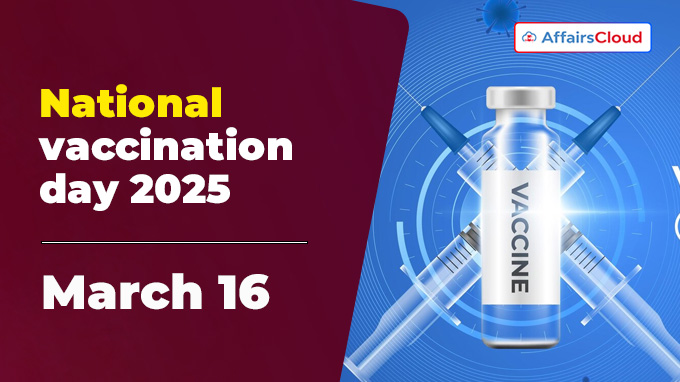 National Vaccination Day (also known as National Immunisation Day, NID) is annually observed across India on 16 March to raise awareness about the importance of timely vaccinations, highlight the significance of vaccines in public health, and focus on immunization as a critical measure to prevent life-threatening diseases.
National Vaccination Day (also known as National Immunisation Day, NID) is annually observed across India on 16 March to raise awareness about the importance of timely vaccinations, highlight the significance of vaccines in public health, and focus on immunization as a critical measure to prevent life-threatening diseases.
- National Vaccination Day commemorates the 1st dose of the Oral Polio Vaccine (OPV) administered in India in 1995.
Significance:
i.The Day acknowledges and appreciates the hard work of frontline healthcare workers to ensure the vaccination of every child.
ii.It also highlights the vital role of full vaccination in protecting children from Vaccine-Preventable Diseases (VPDs).
Background:
i.In 1988, the World Health Assembly (WHA) adopted a resolution for the worldwide eradication of Polio (poliomyelitis), marking the launch of the Global Polio Eradication Initiative (GPEI), spearheaded by national governments, the World Health Organisation (WHO), etc.
ii.On 16 March 1995, the 1st dose of the OPV was administered in India as part of the WHO’s GPEI. Since then, India has been celebrating National Vaccination Day annually.
Note: Polio is a highly infectious disease caused by a virus and it mainly affects children under 5 years of age.
Key Points:
i.In 1994, the Government of Delhi under Dr. Harsh Vardhan’s leadership, pioneered the Pulse Polio Programme, the first-ever large-scale supplementary immunization campaign with OPV.
ii.The campaign, branded with the tagline “Do Boond Zindagi Ki,” (Two drops of life) was launched on 2 October 1994 (Mahatma Gandhi’s birthday).
- The campaign used the OPV strategy, reaching over 1 million children and ensuring every child under 5 was vaccinated
iii.This strategy was later adopted and implemented by the Government of India (GoI) as Pulse Polio Campaigns, the polio eradication campaign.
National Immunization Day (NID):
i.In 1995, the GoI launched National Immunization Day (NID), commonly known as the Pulse Polio Immunization (PPI) program.
- The PPI program was introduced as part of the National Polio Eradication Program (NPEP).
ii.It was conducted twice annually until 2017. The 1st NID was conducted on 9 December 1995 and 20 January 1996 with 1 dose of OPV in each of two rounds.
iii.The NID program is also known as “Polio Ravivar” (Polio Sunday), marking the Sundays on which the immunisation program is conducted.
iv.As recommended by the India Expert Advisory Group (IEAG) for Polio, since 2018, NID has been conducted once in the early part of each year.
v.Additionally, multiple rounds of Sub-National Immunizations Day (SNIDs) have been conducted over the years in high-risk states/areas.
- Since 2017, India has conducted 2 rounds of SNID during the June-November months of the year in the high-risk states/areas of the country.
Points to Note:
i.On 24 February 2012, the WHO removed India from the list of countries with active endemic wild poliovirus transmission.
ii.On 27 March 2014, the WHO South-East Asia Region (SEAR), including India, was certified polio-free by the Regional Polio Certification Commission (RCC).
Key Immunisation and Vaccine in India:
i.In 1978, India launched the Expanded Programme on Immunization (EPI) to provide vaccines to children against various diseases.
- EPI was renamed the Universal Immunization Programme (UIP) in 1985, extending the coverage beyond urban centers to rural areas.
ii.UIP is one of the world’s largest public health programs, targeting over 2.67 crore newborns and 2.9 crore pregnant women annually, providing free vaccines for 12 VPDs.
- Polio was one of the first diseases targeted under UIP.
iii.Mission Indradhanush (MI), launched in December 2014, is a strategic initiative by the GoI aimed at increasing the full immunisation coverage for children across India, to reach 90% coverage.
iv.In 2015, India introduced the Inactivated Polio Vaccine (IPV) in line with the Global Polio Endgame Strategy to eradicate polio.
- IPV provides additional protection against polio, especially against type 2 poliovirus, and it has been expanded nationwide by 2016.
v.Gujarat has achieved 95.95% vaccination coverage under the UIP as part of the Sustainable Development Goal(SDG)-3 Index, surpassing the national average of 93.23%.
Note:
- A vaccine is a biological preparation that provides immunity against specific diseases.
- Vaccination is the process of administering a vaccine to stimulate the immune system.
- Immunisation is the process by which an individual becomes protected from disease through vaccination.
- The first vaccine was developed by English physician Edward Jenner in 1796 against smallpox.
- India’s first vaccination campaign against smallpox began in 1893. Later, in 1978, the BCG vaccine was introduced to combat tuberculosis (TB).




